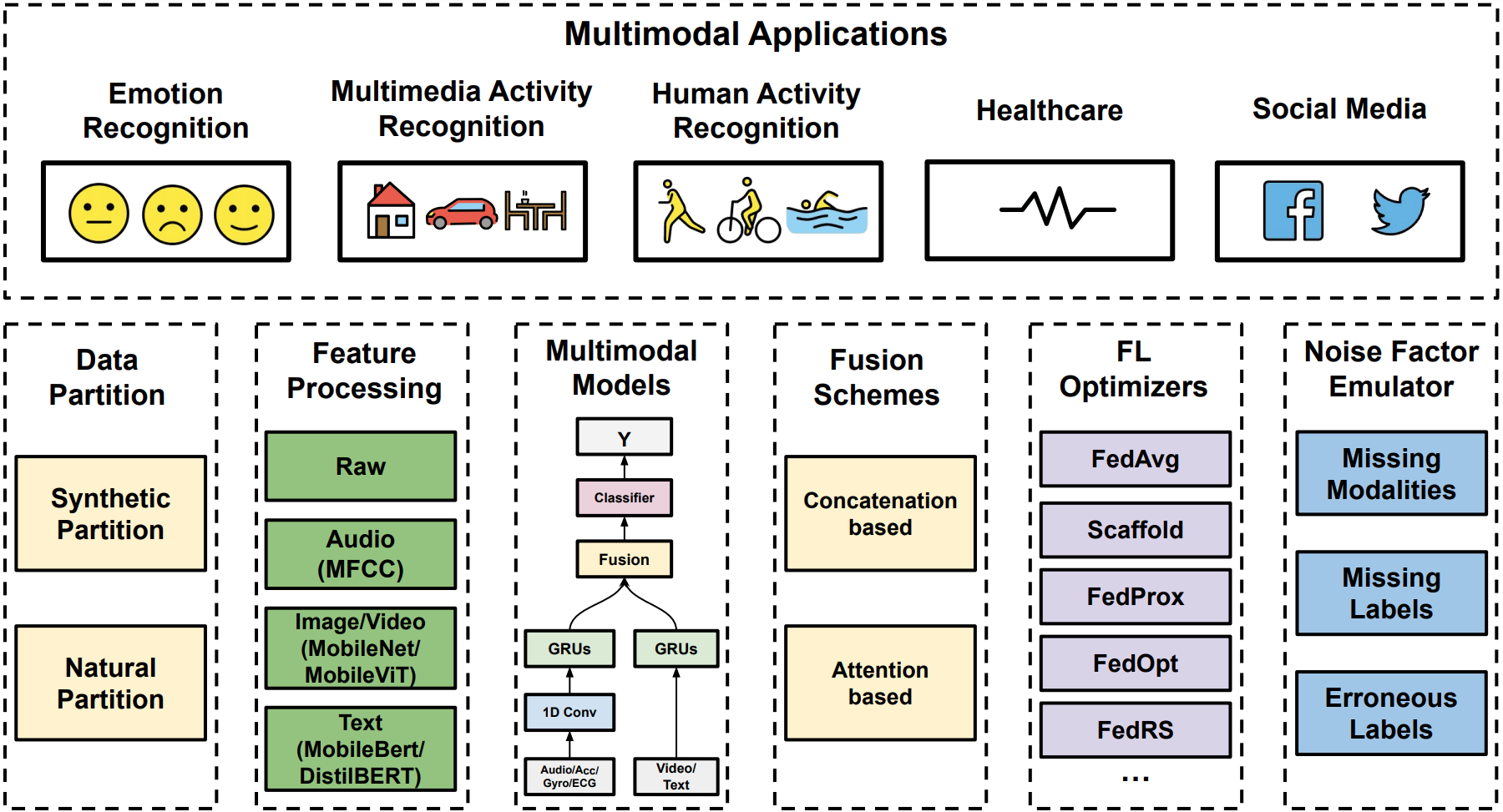FedMutimodal [Paper Link] is an open source project for researchers exploring multimodal applications in Federated Learning setup. FedMultimodal was accepted to 2023 KDD ADS track.
The framework figure:
Image credit: https://openmoji.org/
-
- Emotion Recognition [CREMA-D] [Meld]
- Multimedia Action Recognition [UCF-101] [MiT-51]
- Human Activity Recognition [UCI-HAR] [KU-HAR]
- Social Media [Crisis-MMD] [Hateful-Memes]
-
- ECG classification [PTB-XL]
- Ego-4D (To Appear)
- Medical Imaging (To Appear)
To begin with, please clone this repo:
git clone git@github.com:usc-sail/fed-multimodal.git
To install the conda environment:
cd fed-multimodal
conda create --name fed-multimodal python=3.9
conda activate fed-multimodal
Then pip install the package:
pip install -e .
Feature processing includes 3 steps:
- Data partitioning
- Simulation features
- Feature processing
Here we provide an example to quickly start with the experiments, and reproduce the UCI-HAR results from the paper. We set the fixed seed for data partitioning, training client sampling, so ideally you would get the exact results (see Table 4, attention-based column) as reported from our paper.
You can modify the data path in system.cfg to the desired path.
cd fed_multimodal/data
bash download_uci_har.sh
cd ..
alpha specifies the non-iidness of the partition, the lower, the higher data heterogeneity. As each subject performs the same amount activities, we partition each subject data into 5 sub-clients.
python3 features/data_partitioning/uci-har/data_partition.py --alpha 0.1 --num_clients 5
python3 features/data_partitioning/uci-har/data_partition.py --alpha 5.0 --num_clients 5
The return data is a list, each item containing [key, file_name, label]
For UCI-HAR dataset, the feature extraction mainly handles normalization.
python3 features/feature_processing/uci-har/extract_feature.py --alpha 0.1
python3 features/feature_processing/uci-har/extract_feature.py --alpha 5.0
default missing modality simulation returns missing modality at 10%, 20%, 30%, 40%, 50%
cd features/simulation_features/uci-har
# output/mm/ucihar/{client_id}_{mm_rate}.json
# missing modalities
bash run_mm.sh
cd ../../../
The return data is a list, each item containing: [missing_modalityA, missing_modalityB, new_label, missing_label]
missing_modalityA and missing_modalityB indicates the flag of missing modality, new_label indicates erroneous label, and missing label indicates if the label is missing for a data.
cd experiment/uci-har
bash run_base.sh
cd experiment/uci-har
bash run_mm.sh
| Dataset | Modality | Paper | Label Size | Num. of Clients | Split | Alpha | FL Algorithm | F1 (Federated) | Learning Rate | Global Epoch |
|---|---|---|---|---|---|---|---|---|---|---|
| UCI-HAR | Acc+Gyro | UCI-Data | 6 | 105 | Natural+Manual | 5.0 5.0 0.1 0.1 |
FedAvg FedOpt FedAvg FedOpt |
77.74% 85.17% 76.66% 79.80% |
0.05 | 200 |
Feel free to contact us or open issue!
Corresponding Author: Tiantian Feng, University of Southern California
Email: tiantiaf@usc.edu
@article{feng2023fedmultimodal,
title={FedMultimodal: A Benchmark For Multimodal Federated Learning},
author={Feng, Tiantian and Bose, Digbalay and Zhang, Tuo and Hebbar, Rajat and Ramakrishna, Anil and Gupta, Rahul and Zhang, Mi and Avestimehr, Salman and Narayanan, Shrikanth},
journal={arXiv preprint arXiv:2306.09486},
year={2023}
}
FedMultimodal also uses the code from our previous work:
@inproceedings{zhang2023fedaudio,
title={Fedaudio: A federated learning benchmark for audio tasks},
author={Zhang, Tuo and Feng, Tiantian and Alam, Samiul and Lee, Sunwoo and Zhang, Mi and Narayanan, Shrikanth S and Avestimehr, Salman},
booktitle={ICASSP 2023-2023 IEEE International Conference on Acoustics, Speech and Signal Processing (ICASSP)},
pages={1--5},
year={2023},
organization={IEEE}
}
